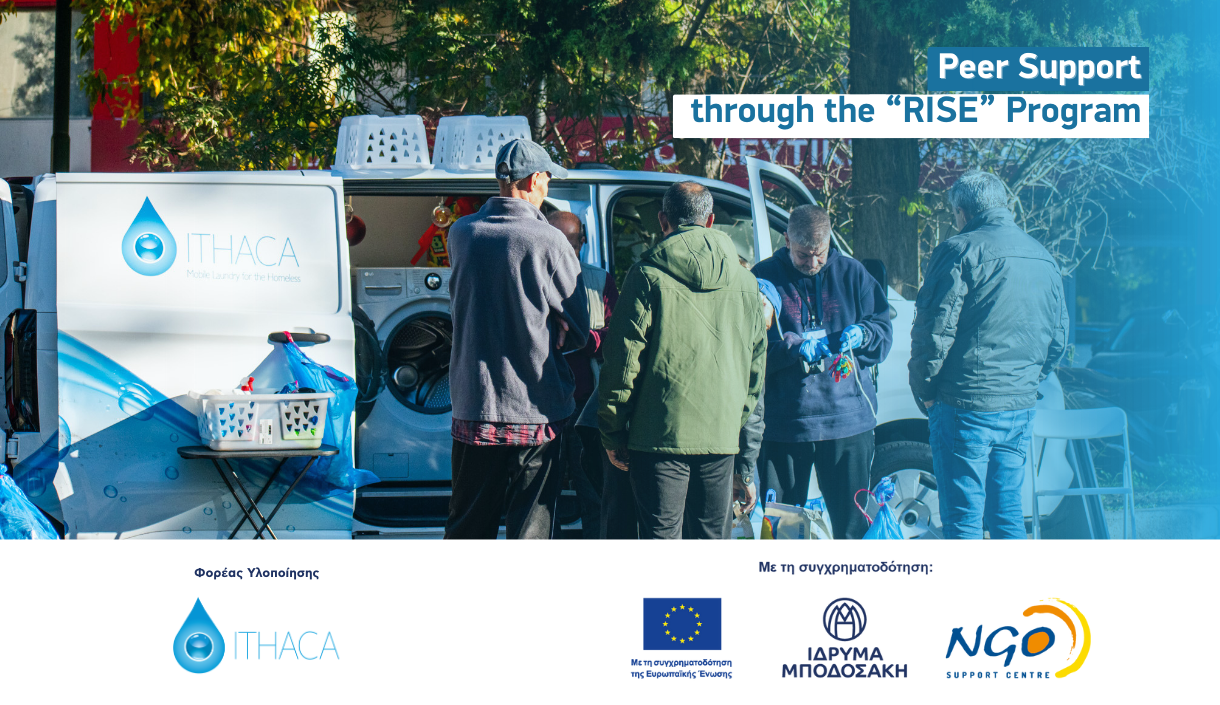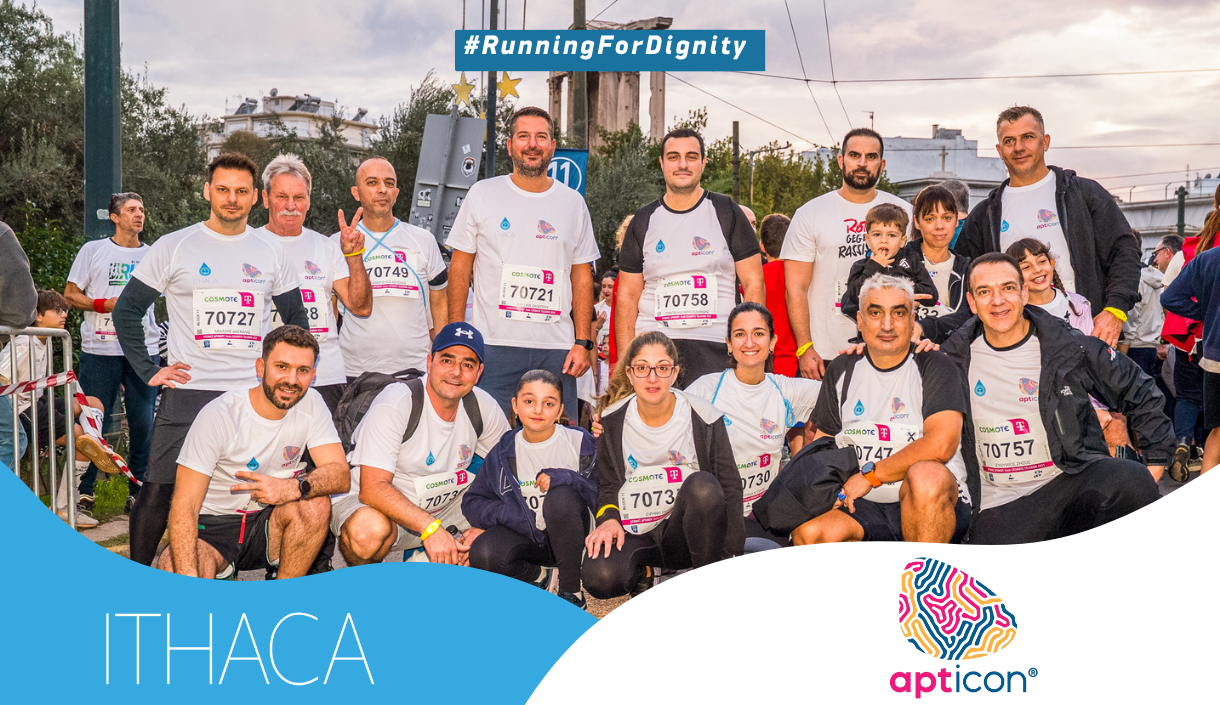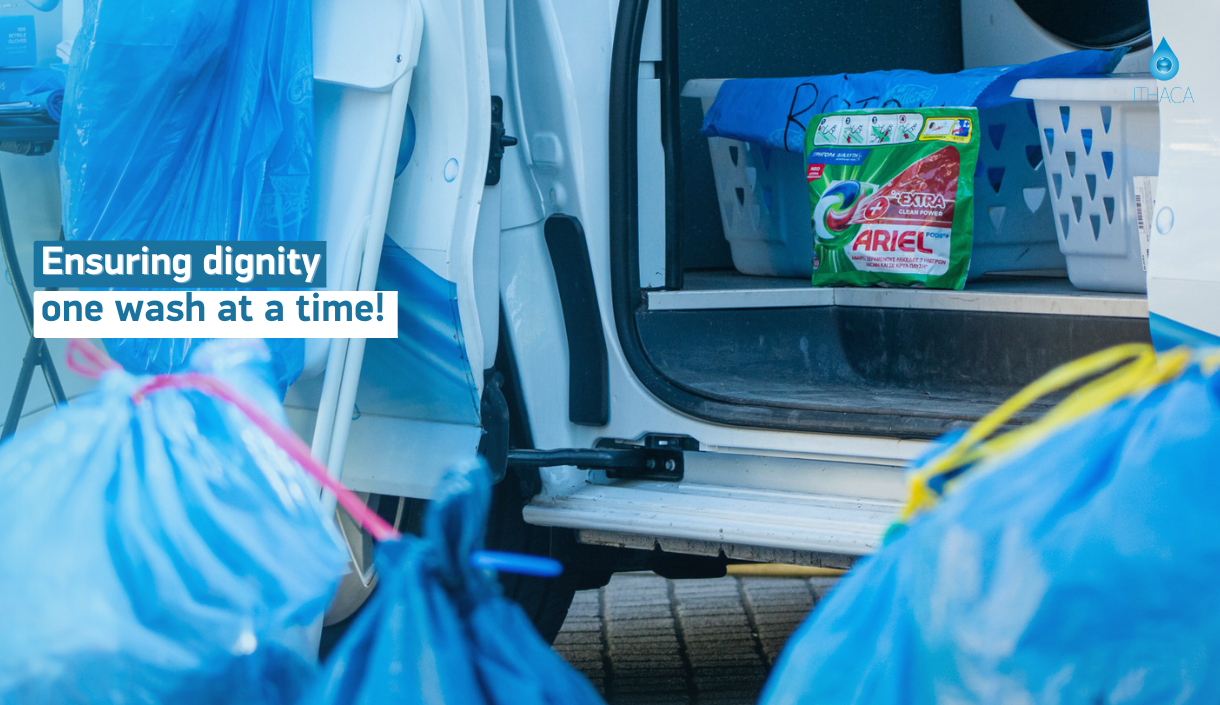
RISE Program: Peer Support aiming at the Effective Reintegration
What is peer support Peer support is a participatory and inclusive approach to social empowerment, grounded in lived experience, equality, and trust. At Ithaca, people
In the following detailed guide, you will find everything you need to know about homelessness.
Homelessness in Greece remains one of the most complex and persistent social issues. It is not only about the absolute lack of housing, but also about housing insecurity, social exclusion, and lack of access to basic services. Thousands of people experience insecurity on a daily basis, without a permanent place to live, without a voice, without support.
At Ithaca, we work with the goal of addressing homelessness through action: providing cleanliness, personal hygiene, psychosocial support, and reintegration tools. We believe that care and dignity are the first step toward a new beginning.
Through this page, we present data, testimonies, and interventions around homelessness in Greece—not as a statistic, but as a human story that concerns us all.
🗓️ October 10 – World Homeless Day
Homelessness has a voice. And today, you can hear it.
Today, on World Homelessness Day, we are sharing a video featuring the voices of three people who found themselves without a home, but not without hope. Fear, loneliness, loss. But also resilience, dignity, second chances. These are not just stories of homelessness. They are stories of life.
🎥 Watch the video. Step into their world for a moment. And let’s make sure no one is invisible.

Homelessness in Greece is a serious social crisis, not limited to life on the streets. It also includes people who stay temporarily in shelters, are hosted by others, or live in inadequate and unsafe housing conditions. Access to stable and decent housing remains an unattainable dream for thousands of our fellow citizens.
The causes are deeply social and economic: unemployment, untreated mental health issues, breakdown of family ties, domestic violence, and the lack of an adequate support framework from the state. Homelessness is not an individual failure; it is evidence of a system that leaves people behind.
Effectively addressing homelessness in Greece requires collective responsibility, active political will, and the strengthening of initiatives that provide housing, work, and social support. Not just temporary solutions, but real opportunities for a new beginning.

Homelessness is not just a term. It is the silent presence of poverty, social exclusion, unemployment, mental illness, and lack of social protection. Homelessness includes:
People living on the street, with no form of housing, sleeping outdoors, in squares, or abandoned buildings.
People living temporarily in shelters or emergency accommodations, without stable, long-term housing solutions.
People temporarily hosted by friends or relatives or living under threat of eviction, domestic violence, or loss of their home—thus in a state of housing insecurity.
People living in inadequate or unsuitable conditions, such as shacks, uninhabitable basements, or homes without access to basic utilities like electricity, water, or toilets.

The causes of homelessness are multifactorial and often do not arise from a single condition. The critical point is that there is rarely a functional and immediate support framework to prevent collapse. Thus, temporary problems turn into permanent states of exclusion.
In more detail:
Unemployment and job insecurity:
Losing a job or working under unstable conditions (part-time, no contracts, undeclared work) makes it impossible to cover basic needs such as rent. Combined with the absence of adequate welfare benefits, homelessness is often the next step.
Rising housing costs:
In recent years, rental prices have increased disproportionately compared to incomes, especially in big cities. Without housing benefits or social housing programs, many people have no other option.
Breakdown of family ties:
Many rely on relatives or friends for shelter. When these relationships collapse—especially without state support—the individual is left exposed.
Domestic violence:
Many victims of domestic or gender-based violence are forced to leave their homes. Without immediate access to safe shelters or social support, they end up without stable housing.
Mental illness without support:
Mental health remains one of the largest gaps in Greece’s welfare system. People with mental disorders or addictions often lack access to continuous care, resulting in social exclusion and homelessness.
Social exclusion:
Vulnerable groups such as refugees, Roma, LGBTQ+ individuals, or former prisoners face institutional and social barriers to accessing work and housing. Without integration into support networks, they are driven into marginalization.
The common denominator of all these factors is the absence of timely and holistic state intervention. Instead of preventive mechanisms (such as rent subsidies, psychological help, temporary accommodation), most people are left alone to face a downward spiral.

In Greece, there is no official and up-to-date study that accurately records the number of people experiencing homelessness. The absence of systematic, nationwide data collection makes estimating the true scale of the issue extremely difficult. Existing figures mainly come from local or fragmentary surveys and cannot be considered representative.
However, considering social indicators—such as the number of people living at or below the poverty line—it becomes clear that the population at risk of or experiencing homelessness is much larger than reported. We are talking about hundreds of thousands of people facing housing insecurity, inability to pay rent or bills, and complete lack of a social support network.
The majority of homeless individuals are found in major urban centers such as Athens, Thessaloniki, and Patras, where high living costs, unemployment, and population density worsen the problem.
At the European level, according to the latest 2024 data, about 1.2 million people in Europe live without stable, adequate, or safe housing—a number that continues to rise, highlighting homelessness as a shared challenge for all of Europe, not just Greece.

Since its founding in 2015, Ithaca has provided multiple forms of support to people experiencing homelessness in Greece. Its entire mission is based on three main pillars of action:
Since 2016, it has operated Europe’s first mobile laundry unit, offering free laundry services and access to cleanliness for homeless and vulnerable groups in the Attica region (Athens & Piraeus) as well as other cities such as Patras. Over the years, it has served more than 9,000 individuals with more than 35,000 visits, delivering over 170 tons of clean clothing. Programs continue steadily in multipurpose centers such as that of the Municipality of Athens, providing over 15 tons of cleaned items annually.
Since 2017, it has run a work reintegration program, employing people who have experienced homelessness within the Mobile Unit or Ithaca’s office—with the goal of helping them re-enter the job market through Ithaca. Since 2021, its Employment Counseling service has expanded to wider vulnerable groups, offering one-on-one sessions for CV writing, skills development, and connections with employers and organizations. To date, Ithaca has played a key role in the social and professional reintegration of dozens of people and has responded to more than 700 requests for psychosocial support and employment counseling.es
Ithaca systematically engages in public awareness and communication actions toward society and the State:
Launching campaigns on homelessness and poverty,
Participating in networks and collaborations with organizations and institutions,
Supporting policy changes to improve access to basic goods and social protection.
Vision:
To strengthen social inclusion and reduce social exclusion, so that the most vulnerable can once again find their own “Ithaca”—dignity and the opportunity for a meaningful life.
Mission:
To improve living conditions through hygiene services, work reintegration, and raising awareness about homelessness and poverty.
Ithaca operates mainly in Attica (central Athens & Piraeus) but has expanded its mobile unit to other cities such as Patras. It also responds to emergency needs (natural disasters, extreme weather conditions), offering immediate relief to the homeless community.
These expanded activities—from daily hygiene to social reintegration and policy advocacy—make Ithaca a vital “bridge” for those excluded from the system, restoring dignity and opportunities for change.

What is peer support Peer support is a participatory and inclusive approach to social empowerment, grounded in lived experience, equality, and trust. At Ithaca, people

Every kilometer, every breath, every step was a step for dignity.At this year’s Athens Marathon, 130 runners wore the colors of Ithaca, joining forces in

Every year on October 10th, World Homelessness Day reminds us that homelessness is not simply the absence of a home — it is a complex

What does a child really need to start school with a smile? A few notebooks, some pencils, maybe a backpack. But above all, what they

A clean piece of clothing is never just fabric. It is dignity, self-confidence, and hope. For people experiencing homelessness, access to clean clothes in summer

Summer heat isn’t just uncomfortable—it can be deadly for those living on the streets. Heatwave and homelessness is a dangerous combination, as unhoused people lack
Homelessness in Greece refers to the absence of stable and decent housing. It includes people living on the street, in temporary shelters, or in unsafe conditions without social support.
Homelessness in Greece is caused by factors such as unemployment, poverty, the housing crisis, mental health issues, and domestic violence. Many homeless people have experienced long-term social exclusion.
Yes. Public and private organizations offer programs for temporary housing, psychosocial support, and professional reintegration. Ithaca contributes by providing hygiene services and social reintegration.
The exact number is difficult to determine due to the lack of official studies, but according to organizations and surveys, thousands of people live without stable housing, mainly in urban centers such as Athens and Thessaloniki.
You can get informed, support organizations such as Ithaca, donate essential items, volunteer, or participate in awareness and advocacy campaigns.
Ithaca operates the first Mobile Laundry Unit for the homeless in Europe, providing cleanliness, dignity, and social reintegration through employment. It is an innovative initiative that contributes to social inclusion.